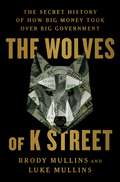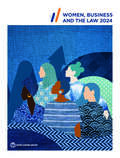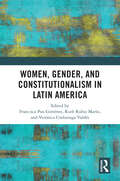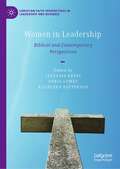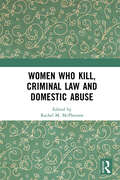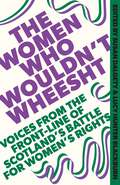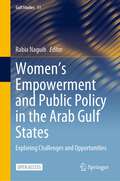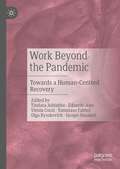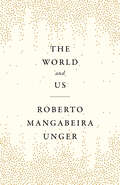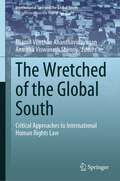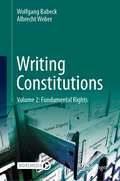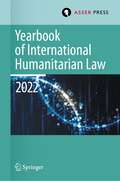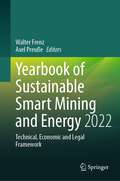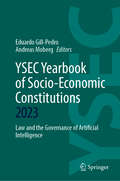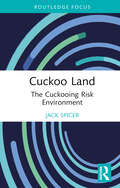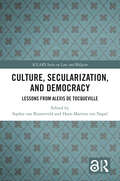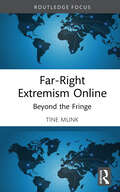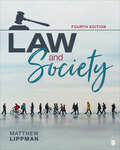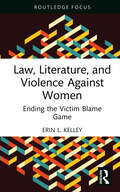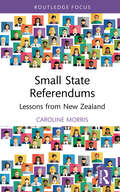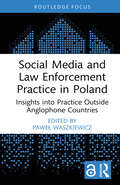- Table View
- List View
The Wolves of K Street: The Secret History of How Big Money Took Over Big Government
by Brody Mullins Luke MullinsTwo veteran investigative journalists trace the rise of the modern lobbying industry through the three dynasties—one Republican, two Democratic—that have enabled corporate interests to infiltrate American politics and undermine our democracy.On K Street, a few blocks from the White House, you&’ll find the offices of the most powerful men in Washington. In the 1970s, the city&’s center of gravity began to shift away from elected officials in big marble buildings to a handful of savvy, handsomely paid operators who didn&’t answer to any fixed constituency. The cigar-chomping son of a powerful Congressman, an illustrious political fixer with a weakness for modern art, a Watergate-era dirty trickster, the city&’s favorite cocktail party host…these were the sorts of men who now ran Washington. Over four decades, they&’d chart new ways to turn their clients&’ cash into political leverage, abandoning favor-trading in smoke-filled rooms for increasingly sophisticated tactics like &“shadow lobbying,&” where underground campaigns sparked seemingly organic public outcries to pressure lawmakers into taking actions that would ultimately benefit corporate interests rather than the common good. With billions of dollars at play, these lobbying dynasties enshrined in Washington a pro-business consensus that would guide the country&’s political leaders—Democrats and Republicans alike—allowing companies to flourish even as ordinary Americans buckled under the weight of stagnant wages, astronomical drug prices, unsafe home loans, and digital monopolies. A good lobbyist could kill even a piece of legislation supported by the president, both houses of Congress, and a majority of Americans. Yet, nothing lasts forever. Amidst a populist backlash to the soaring inequality these lobbyists helped usher in, Washington&’s pro-business alliance suddenly began to unravel. And while new ways for corporations to control the federal government would emerge, the men who&’d once built K Street found themselves under legal scrutiny and on the verge of financial collapse. One had his namesake firm ripped away by his own colleagues. Another watched his business shut down altogether. One went to prison. And one was found dead behind the 18th green of an exclusive golf club, with a bottle of $1,500 wine at his feet and a bullet in his head. A dazzling and infuriating portrait of fifty years of corporate influence in Washington, The Wolves of K Street is a masterpiece of narrative nonfiction—irresistibly dramatic, spectacularly timely, explosive in its revelations, and absolutely impossible to put down.
Women, Business and the Law 2024 (Women, Business and the Law)
by World BankWomen, Business and the Law 2024 is the 10th in a series of annual studies measuring the enabling conditions that affect women’s economic opportunity in 190 economies. To present a more complete picture of the global environment that enables women’s socioeconomic participation, this year Women, Business and the Law introduces two new indicators—Safety and Childcare—and presents findings on the implementation gap between laws (de jure) and how they function in practice (de facto). This study presents three indexes: (1) legal frameworks, (2) supportive frameworks (policies, institutions, services, data, budget, and access to justice), and (3) expert opinions on women’s rights in practice in the areas measured. The study’s 10 indicators—Safety, Mobility, Workplace, Pay, Marriage, Parenthood, Childcare, Entrepreneurship, Assets, and Pension—are structured around the different stages of a woman’s working life. Findings from this new research can inform policy discussions to ensure women’s full and equal participation in the economy. The indicators build evidence of the critical relationship between legal gender equality and women’s employment and entrepreneurship. Data in Women, Business and the Law 2024 are current as of October 1, 2023. wbl.worldbank.org
Women, Gender, and Constitutionalism in Latin America
by Francisca Pou Giménez, Ruth Rubio Marín, and Verónica Undurraga ValdésThis book discusses to what extent and how constitutional design and practice in Latin America have helped in combatting the subordination of women and LGBTQIA+ people. Covering 11 jurisdictions, the chapters identify the main elements of the constitutional gender order and survey jurisprudential and legislative developments in different areas, incorporating contextual analysis and references to history, political dynamics, social movements, feminist struggles, normative efficacy, and policy.In the context of a constitutionalism that has been celebrated as particularly innovative and socially engaged, the book assesses constitutional performance in the quest to supersede the separate gendered spheres tradition and the subordination of women and sexual minorities to heteronormative hegemony. It fills an important gap in the field of gender and constitutionalism, which has paid very little attention to Latin America compared to the Anglo-American legal world and continental Europe. It identifies regional trends, but also variables which account for the diversity of approaches in various jurisdictions.The book provides much-needed insight into matters that are relevant for legal and socio-legal scholars, an ever-growing number of social actors and movements, and all those interested in comparative constitutionalism and in the intersections between law and gender.
Women in Leadership: Biblical and Contemporary Perspectives (Christian Faith Perspectives in Leadership and Business)
by Stefanie Ertel Doris Gomez Kathleen PattersonThis book offers a biblically-based and research-centered exploration of the unique and important role of women in leadership across multiple domains. Divided into two sections, the chapters begin by examining biblical examples of women in leadership, such as Esther and the woman of Proverbs 31, and passages focused on women, such as 1 Timothy 2 and Romans 16, before presenting contemporary perspectives with discussions on topics such as submission, DEI, and work-life balance. Taking a neutral position not siding with feminist or patriarchal extremes, this book will contribute to debates on leadership and gender in the fields of organizational behaviour, HRM, I/O psychology, and gender studies.
Women Who Kill, Criminal Law and Domestic Abuse
by Rachel M. McPhersonThis book presents an informed, coherent and stimulating analysis of UK legal defences of homicide by victims of domestic abuse. Women killing following domestic abuse from a male partner is a significant category of homicide. In some areas of the UK it represents the most common context in which women kill. Yet, despite its significance, it is an aspect of homicide that remains under-researched within a UK context. Much of what is known about cases of this type comes from other jurisdictions. This book brings together a coherent understanding of the UK landscape in this area. It builds upon existing literature, particularly from the US, which has examined this issue from a practical perspective, using the lived experiences of practitioners involved in cases of this type. The collection combines the experiences of those in practice with academic expertise, pointing to potential sites of injustice that exist in this context and offering suggestions for reform. The volume will be a valuable guide for those involved in cases of this nature whilst also offering insight to those academics with an interest in homicide and legal responses to domestic abuse. The book will also be of interest to those working in the area of comparative criminal justice.
The Women Who Wouldn't Wheesht
by Susan Dalgety Lucy Hunter BlackburnTHE SUNDAY TIMES BESTSELLEROn the 25th anniversary of the Scottish Parliament, this book captures an important moment in contemporary history: how a grassroots women's movement, harking back to the suffragettes and second wave feminists of the 1970s and 1980s, took on the political establishment - and changed the course of history.Through a collection of over thirty essays and photographs, some of the women involved tell the story of the five-year campaign to protect women's sex-based rights. Author J.K. Rowling explains why she used her global reach to stand up for women. Leading SNP MP Joanna Cherry writes of how she risked her political career for her beliefs. Survivors of male violence who MSPs refused to meet are given the voice they were denied at Holyrood. Ash Regan MSP recounts what it was like to become the first government minister to resign on a question of principle since the SNP came to power in 2007. Former prison governor Rhona Hotchkiss charts how changes in prison policy in Scotland led to the controversy over Isla Bryson.It is the story of women who risked their job, reputation, even the bonds of family and friendship, to make their voices heard, and ended up - unexpectedly - contributing to the downfall of Nicola Sturgeon, Scotland's first woman first minister.Above all, it is the story of the women who wouldn't wheesht.
Women's Empowerment and Public Policy in the Arab Gulf States: Exploring Challenges and Opportunities (Gulf Studies #11)
by Rabia NaguibThis open access book explores the various dimensions of women’s empowerment in public policy in the Gulf Cooperation Council (GCC) region, with a particular focus on Qatar, comparing the country to the other Gulf states. Through its rich compilation of empirical qualitative research, the text unpacks the various ways in which women’s empowerment materializes in the GCC context, providing insights into public policy perspectives in high-income rentier states more broadly. The Arab world has long been part of the global dialogue on women’s economic and political empowerment and the GCC has, over the past decade, situated women’s empowerment amongst their respective national priorities and long-term strategies. In turn, the Gulf has seen gradual implementation of policies aimed at women, specifically, in looking to attract and retain them in the labour market, and in the public sector more broadly. The collection surveys and evaluates the progress made in recent decades, paying close attention to the cultural and policy constraints still limiting women’s empowerment in the Gulf. With a key linkage to SDG5, this book is a timely text addressing the context and drivers behind policies centering on women in the Arab region, in its analysis of the interplay of international women’s empowerment discourse and regional public policy decisions. It is relevant to researchers and policy makers focused on women and gender issues in relation to social, cultural, economic, and political empowerment in the Gulf specifically, but also in the Arab world and beyond.
Work Beyond the Pandemic: Towards a Human-Centred Recovery
by Tindara Addabbo Edoardo Ales Ylenia Curzi Tommaso Fabbri Olga Rymkevich Iacopo SenatoriThis book addresses the impact of Covid-19 on employment relations and provides a reconstruction and a critical assessment of the measures enacted worldwide to tackle the economic and social crisis triggered by the global health emergency. The pandemic has been a booster of critical issues that for years have been silently shaping society and the labor market and so it can represent an opportunity to relaunch a critical analysis on the future of work.Beginning from this assumption, this book collects contributions from different disciplines, including law, economics and organization theory. It covers topics such as the measures enacted to protect workers’ health and cushion the labour, the new inequalities that emerged during the pandemic and the strategies to construct a sustainable and human-centred development in the post pandemic scenario. It is highly relevant to scholars and students of organisation studies, resilience, the labour market and labour law.
The World and Us
by Roberto Mangabeira Unger"A restless visionary striving to realize the highest aspirations of modernity itself."–New York TimesA radical re-envisioning of the human condition by the acclaimed Brazilian philosopherIn The World and Us, Roberto Mangabeira Unger sets out to reinvent philosophy. His central theme is our transcendence, everything in our existence points beyond itself, and its relation to our finitude: everything that surrounds us, and we ourselves, are flawed and ephemeral.He asks how we can live so that we die only once, instead of dying many small deaths; how we can breathe new life and new meaning into the revolutionary movement that has aroused humanity for the last three centuries, but that is now weakened and disoriented; and how we can make sense of ourselves without claiming for human beings a miraculous exception to the general regime of nature. For Unger, philosophy must be the mind on fire, insisting on our prerogative to speak to what matters most.From this perspective, he redefines each of the traditional parts of philosophy, from ontology and epistemology to ethics and politics. He turns moral philosophy into an exploration of the contest between the two most powerful contemporary moral visions: an ethic of self-fashioning and non-conformity, and an ethic of human connection and responsibility.And he turns political philosophy into a program of deep freedom, showing how to democratize the market economy, energize democratic politics, and give the individual worker and citizen the means to flourish amid permanent innovation.
World Review: Environmental and Sustainability Education in the Context of the Sustainable Development Goals
by Marco Rieckmann Rosalba Thomas MuñozThe global landscape of education has been reshaped by the COVID-19 pandemic, revealing the various challenges faced by countries worldwide. This book provides a comprehensive exploration of Environmental and Sustainability Education (ESE) across different countries, offering unique insights into their histories, challenges, achievements, and future ESE needs. From Africa to Oceania, the book delves into the vital role of ESE in the context of the UN Sustainable Development Goals. It highlights the diverse national discourses and the flexibility required to deliver effective global education programs. ESE practitioners, researchers, and policymakers worldwide will find inspiration and invaluable perspectives in this book.
The Wretched of the Global South: Critical Approaches to International Human Rights Law (International Law and the Global South)
by Thamil Venthan Ananthavinayagan Amritha Viswanath ShenoyThe books aims to discuss and present an alternative epistemology of human rights, against the background of the globalization from below. The interdependent network of transnational networks, ranging from social movements, NGOs, and other groupings, questions the neoliberal paradigm and a particular set of human rights. This book wishes to transform this discourse on human rights and amplify the subaltern voices. The book also aims to highlight alternative practices of freedom that decenter human rights as a liberation discourse. Following Julia Suarez-Krabbe in “Race, Rights and Rebels”, the authors aim to amend to practices of freedom that center different orders of knowledge on subjectivity and agency. The proposed book, first, situates the problem of representation of the marginalized voices in contemporary legal and political discourse. Second, it offers critiques in theory, and, third, followed by alternative practices that emanate from marginalized localities. In particular, this book wishes to reflect upon alternatives rooted in legal and non-legal responses to address human rights grievances. In the end, this book envisages, along the lines of Frantz Fanon, to vision the possibility of the human by a new concept, addressing the concerns in various ways: As Fanon argued for “a new start”, “a new way of thinking”, and for the creation of a “new man”, it is pertinent to trigger a human rights project from the below.^
Writing Constitutions: Volume 2: Fundamental Rights
by Wolfgang Babeck Albrecht WeberWriting Constitutions intends to serve as a practical manual for those writing constitutions or interested in their design. It is the first systematic and universal approach to coherently capture concepts and contents of a modern constitution. Volume II is a user-friendly guide covering the current best practice in human rights and contains a draft catalogue of human rights. It empowers judges, lawyers, civil rights activists, legislators, and academics to draft and interpret over 70 Human Rights and strengthen democracies. Writing Constitutions comes in three volumes:- Volume I: Institutions- Volume II: Fundamental Rights- Volume III: Constitutional Principles
Yearbook of International Humanitarian Law, Volume 25: International Humanitarian Law and Neighbouring Frameworks (Yearbook of International Humanitarian Law #25)
by Heike Krieger Pablo Kalmanovitz Eliav Lieblich Stavros Evdokimos PantazopoulosVolume 25 of the Yearbook of International Humanitarian Law (IHL) sheds light on the interplay between IHL and other adjacent branches of international law. This Volume moves beyond the traditional preoccupation of examining IHL’s relations with international human rights law, the law on the use of force and international criminal law. Authors were invited to discuss, both in general and specific terms, doctrinally and theoretically, interactions between IHL and other neighbouring frameworks. Accordingly, this Volume is dedicated to exploring the interrelationship between IHL and other adjacent frameworks, such as international environmental law, international investment law, the law on defences to state responsibility, and counter-terrorism law.The Volume contains four articles dedicated to the subject of IHL and neighbouring frameworks. The Volume further features a Focus section on IHL controversies arising from Russia’s aggression against Ukraine, and ends, as usual, with a Year in Review section.The Yearbook of International Humanitarian Law is a leading annual publication devoted to the study of international humanitarian law. The Yearbook has always strived to be at the forefront of the debate of pressing doctrinal questions of IHL, and will continue to do so in the future. As this Volume demonstrates, it offers a space where IHL-related issues can be explored both from a doctrinal and a theoretical perspective. It provides an international forum for high-quality, peer-reviewed academic articles focusing on this crucial branch of international law.Distinguished by contemporary relevance, the Yearbook of International Humanitarian Law bridges the gap between theory and practice and serves as a useful reference tool for scholars, practitioners, military personnel, civil servants, diplomats, human rights workers, and students.
Yearbook of International Sports Arbitration 2018–2020 (Yearbook of International Sports Arbitration)
by Antoine Duval Antonio RigozziThe Yearbook of International Sports Arbitration is the first academic publication aiming to offer comprehensive coverage, on a yearly basis, of the most recent and salient developments regarding international sports arbitration, through a combination of general articles and case notes. The present volume covers decisions rendered by the Court of Arbitration for Sport (CAS), and national courts significant international and domestic between 2018-2020. It is a must-have for sports lawyers, arbitrators, and researchers engaged in this field. From the ECtHR's landmark ruling in the Mutu & Pechstein case, through the Russian doping scandal, to the first Sun Yang award, it features in-depth articles on important issues raised by international sports arbitration, as well as independent commentaries by academics and practitioners on the most significant international and domestic decisions rendered in the period under review. Dr. Antoine Duval is Senior Researcher at the T.M.C. Asser Instituut in The Hague and heads the Asser International Sports Law Centre. Prof. Antonio Rigozzi teaches international arbitration and sports law at the University of Neuchâtel, Switzerland, and is the partner in charge of the sports arbitration practice at Lévy Kaufmann-Kohler, a Geneva-based law firm specializing in international arbitration.
Yearbook of Sustainable Smart Mining and Energy 2022: Technical, Economic and Legal Framework (Yearbook of Sustainable Smart Mining and Energy - Technical, Economic and Legal Framework #2)
by Walter Frenz Axel PreußeThis book covers several aspects of the application of Sustainable Development Goals to mining related subjects. The included works range from methods to assess and implement sustainability to discussions of legal impacts and relations as well as technological developments and outlooks. First, the challenges and opportunities of clean energy transition in the African mining sector are described. With regard to the assessment of sustainable developments, this book includes the applications of the sieving method, the concept of thermodynamics and the United Nations Framework Classification to mining projects and case studies. The implementation of Sustainable Development Goals into academic project work and education of geo-engineers is covered as well. The legal topics contain discussions of corporate climate liabilities and extraterritorial legal responsibilities as well as an analysis of the impact of the German Federal Constitutional Court's climate decision. Important mining aspects and technological developments like proactive water management, sustainable approaches to mine closure and implementation of ventilation on demand in underground mines are described. In addition, the state and potential of the Mongolian raw materials industry is covered. The Sustainable Smart Mining and Energy Yearbook is not only aimed at researchers and professionals, but at all who want to get an overview of current important technical and legal topics in this field.
YSEC Yearbook of Socio-Economic Constitutions 2023: Law and the Governance of Artificial Intelligence (YSEC Yearbook of Socio-Economic Constitutions #2023)
by Eduardo Gill-Pedro Andreas MobergArtificial intelligence (AI) has the potential to radically transform our society. It may lead to a massive increase in the capabilities of humankind and allow us to address some of our most intractable challenges. It may also entail profound disruption to structures and processes that have sustained our society over centuries. These developments present a unique challenge to the socio-economic constitutional arrangements which govern our world at national, regional and international level. The deployment of increasingly powerful AI systems, able to function with increasing degree of autonomy, has led to concerns over loss of human control of important societal processes, over the disruption of existing economic, social and legal relationships, and over the empowerment of some societal actors at the expense of others, together with the entrenchment of situations of domination or discrimination. It has also made increasingly clear how tremendous the potential benefits, that these technologies may bring, are to those who successfully develop and deploy them. There is therefore great pressure on governments, international institutions, public authorities, civil society organisations, industry bodies and individual firms to introduce or adapt mechanisms and structures that will avoid the potentially negative outcomes of AI and achieve the positive ones. These mechanisms and structures, which have been given the umbrella term ‘AI governance’, cover a wide range of approaches, from individual firms introducing ethical principles which they volunteer to abide by, to the European Union legislating an AI Act, which will prohibit certain types of AI applications and impose binding obligations on AI developers and deployers. The fast pace of innovation in the development of AI technologies is mirrored by the fast pace of development of the emerging field of AI governance, where traditional legislation by public bodies is complemented with more innovative approaches, such ashybrid and adaptive governance, ethical alignment, governance by design and the creation of regulatory sandboxes. The chapter “AI and Sensitive Personal Data Under the Law Enforcement Directive: Between Operational Efficiency and Legal Necessity” is available open access under a Creative Commons Attribution 4.0 International License via link.springer.com.
Cuckoo Land: The Cuckooing Risk Environment (Drugs, Crime and Society)
by Jack SpicerDrawing on rich qualitative data, this book presents a novel way of understanding the drug market-related harm of ‘cuckooing’, providing a theoretically informed account of this increasingly high-profile area.Applying the framework of the ‘risk environment’, the book examines why people become cuckooed, how it is responded to and how this exploitative practice is socially produced. In doing so, a diverse range of environments and features relevant to cuckooing are analysed, including the role of housing, political economy, drug policy, policing and social exclusion. By interrogating how these constrain and enable the actions of people who are affected, the book develops a critical analysis that recognises the complexity of cuckooing while eschewing superficial explanations of why it occurs. Resisting simplistic solutions, it also considers what an enabling environment capable of reducing the harms of this exploitative practice might look like.Cuckoo Land will be of interest to academic researchers in the fields of criminology, victimology, social work and drugs. It will also be essential reading for policymakers and practitioners working on the issue of cuckooing.
Culture, Secularization, and Democracy: Lessons from Alexis de Tocqueville (ISSN)
by Sophie van Bijsterveld and Hans-Martien ten NapelFollowing the approach developed by Alexis de Tocqueville, this volume views democracy as a cultural phenomenon. It starts from the assumption that if we are to adequately address concerns about the current state and future of modern Western democracies, we need first to tackle the cultural preconditions necessary for the functioning of a democracy.Since Tocqueville’s time, the book takes the most crucial change in the West to be ‘double secularisation’. Here, this concerns, first, the diminished influence of organised Christianity. Even though secularity was partly a product of Christianity, secularisation is highly significant in terms of the cultural underpinnings of Western democracy. Second, it involves a decreased interest in and knowledge of classical philosophy.Chapters on secularity, family life, civic life, and public spirit focus on central elements of the changed cultural foundation of democracy, exploring issues such as identity politics, the public space, and the role of human rights and natural law in a pluralistic and resilient democracy. The volume concludes with a closer look at the implications of current presentism, that is, the view that only the present counts for the legitimacy and effectiveness of democratic systems. Finally, it asks if double secularisation can also offer fresh opportunities for promoting the conditions of a viable democracy.The book will be of interest to academics and researchers working in the areas of law and religion, constitutional law, political science, history, and philosophy.
Far-Right Extremism Online: Beyond the Fringe (Routledge Studies in Digital Extremism)
by Tine MunkBy imparting crucial insights into the digital evolution of far-right extremism and its challenges, this book explores how far-right extremism has transformed, utilising digital spaces for communication and employing coded language to evade detection.Far-right extremism has spread extensively across online platforms. Flourishing within echo chambers, these groups propagate different types of online and offline actions and advance their hateful ideologies to a wide-ranging audience. This book highlights the issues surrounding far-right extremism, which distinguishing it from terrorism and examining its contemporary digital manifestations. Importantly, it sheds light on how far-right groups utilise online platforms for communication, radicalisation, and on-ground actions, relying on alternative truths, misinformation, conspiracy theories, fashion, and memes to connect with like-minded individuals. The book also addresses content moderation challenges and the impact of rising populism in today’s political climate, which fuels societal divisions and uncertainty.Far-Right Extremism Online is a valuable resource for academics, students, analysts, and professionals working in counter-extremism, cybersecurity, digital communication, and national security. It is also an indispensable guide for those concerned about far-right extremism in the digital age.
Law and Society
by Matthew LippmanLaw and Society, Fourth Edition, offers a contemporary overview of the structure and function of legal institutions, along with a lively discussion of both criminal and civil law and their impact on society. Unlike other books on law and society, Matthew Lippman takes an interdisciplinary approach that highlights the relevance of the law throughout our society. Distinctive coverage of diversity, inequality, civil liberties, and globalism is intertwined through an organized theme in a strong narrative. The highly anticipated Fourth Edition of this practical and invigorating text introduces students to both the influence of law on society and the influence of society on the law. Discussions of the pressing issues facing today′s society include key topics such as the law and inequality, international human rights, privacy and surveillance, and law and social control.
Law and Society
by Matthew LippmanLaw and Society, Fourth Edition, offers a contemporary overview of the structure and function of legal institutions, along with a lively discussion of both criminal and civil law and their impact on society. Unlike other books on law and society, Matthew Lippman takes an interdisciplinary approach that highlights the relevance of the law throughout our society. Distinctive coverage of diversity, inequality, civil liberties, and globalism is intertwined through an organized theme in a strong narrative. The highly anticipated Fourth Edition of this practical and invigorating text introduces students to both the influence of law on society and the influence of society on the law. Discussions of the pressing issues facing today′s society include key topics such as the law and inequality, international human rights, privacy and surveillance, and law and social control.
Law, Literature, and Violence Against Women: Ending the Victim Blame Game
by Erin L. KelleyThis book engages legal and literary texts in order to examine acquaintance crimes, such as rape, sexual harassment, stalking, and domestic abuse, and to challenge how the victim’s physical or psychological "freeze response" is commonly and inaccurately mistaken for her consent.Following increased interest in the #MeToo movement and the discoveries of sexual abuse by numerous public figures, this book analyzes themes in law and literature that discredit victims and protect wrongdoers. Interpreting a present-day novel alongside legislation and written court cases, each chapter pairs a fictional text with a nonfictional counterpart. In these pairings, the themes, events, and arguments of each are carefully unpacked and compared against one another. As the cross-readings unfold, we learn that a victim does not "ask for it," and she should not arouse suspicions just because she does not fight, run away, or report the crime. Instead, and as this book demonstrates, the more common and most practical response is to become physically and mentally paralyzed by fear; the victim dissociates, shuts down, and remains stuck in the fright and captivity of abuse.This book will interest scholars and students working in, and especially at the intersection of, law, literature, gender studies, and criminology.
Small State Referendums: Lessons from New Zealand
by Caroline MorrisThis book explores the unusual and unique experience of direct democracy in the small state of New Zealand, where referendums have been a persistent feature of the political landscape for over a century. Referendums have been the site of renewed interest from scholars, seeking to respond to what they term the "democratic deficit" in otherwise stable and functional Western democracies. They have also been at the heart of many divisive and important political and social moments in recent history, from the UK’s Brexit referendum in 2016 to the disputed legitimacy of the 2022 referendums in Russian-occupied Ukraine. This book fills an important gap in the literature through an extended study of the law and practice of referendums in the small Commonwealth state of New Zealand. It also expands the field of small state democracy studies by applying the insights of this field to the direct democracy experience of a small state. With the inclusion of comprehensive tables of referendums and legislative materials, this book will be of interest to scholars of direct democracy and small states, politicians, legislators and policy makers, and all those with a desire to do democracy better.
Social Impact, Organizations and Society: The Contemporary Role of Corporate Social Responsibility (Routledge Studies in Management, Organizations and Society)
by Magdalena Stefańska Katarzyna Bachnik Magdalena Kaźmierczak Magdalena Rojek-Nowosielska Justyna Szumniak-SamolejSocial Impact, Organizations and Society represents endeavors to comprehensively explore the essence of social impact. The editors aim to elucidate its definition, scope, measurement and implementation. Delving into how organizations integrate social impact into their core missions, decision-making processes and operational frameworks, this monograph strives to identify avenues for enhancing social impact generation. Furthermore, its focus lies on fostering effective relationships with diverse stakeholder groups and providing empirical evidence of social impact practices across industries and sectors. Through an in-depth examination of the latest research, this monograph sheds light on the evolving role of corporate social responsibility and its significance amidst contemporary challenges.
Social Media and Law Enforcement Practice in Poland: Insights into Practice Outside Anglophone Countries (Routledge Studies in Crime, Culture and Media)
by Paweł WaszkiewiczThis book explores the role of social media in the daily practice of Polish criminal justice and how social media is, in turn, reshaping this practice. Based on empirical research, it confronts common beliefs about how police officers, prosecutors, and judges use social media in their work. Readers will find answers to the following questions: Which social media platforms are popular among law enforcement officers in Poland? How do the police use social media to investigate and prosecute crimes? What are the strategies for using social media to communicate with the community? What strategies are most successful?The findings in this book challenge some popular beliefs and theories about social media in criminal justice. As the first book to explore the use of social media in criminal justice outside of English-speaking countries, this collection of academic research will be of interest to academics focusing on criminology, criminal justice, and policing and will be useful to police leaders and officers, police social media administrators, prosecutors, and judges, who may be inspired by the research to implement new successful and more effective practices.The Open Access version of this book, available at www.taylorfrancis.com, has been made available under a Creative Commons Attribution-NonCommercial (CC-BY-NC) 4.0 International license. The costs of the Open Access publication were covered by the University of Warsaw under the Excellence Initiative Research University Action I.2.4 Supporting Open Access Publications.
